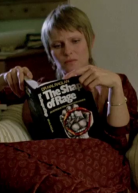Tuesday, September 11, 1979.
THE BROOD. Music by Howard Shore. Written and directed by David Cronenberg. Running time: 86 minutes. Restricted entertainment with the B.C. Classifier’s warning: some gory violence and frightening scenes.
OF COURSE WE HAVE to take David Cronenberg seriously.
For one thing, he makes money. For another, he makes movies that have a strong thematic consistency, something that makes him more than just another exploitation filmmaker. Among horror addicts, he’s considered a legitimate auteur.
At 36 [in 1979], Cronenberg is the most successful English-Canadian film director who actually works in Canada. When Variety compiled its list of our top-grossing 1978 productions, he was the only one to have two pictures on it.
(For the record, Shivers, released in 1975, held the fifth position. Rabid, from 1977, was number eight.)
Next month, when the list is revised, he will probably increase his showing to three features. The Brood, currently on view [1979], has already registered more dollars at the box office than either of his previous pictures.
Thematically, Cronenberg combines the fear of modern medical malfeasance with Old Testament morality. His most recent films all feature a doctor whose story turns into an exploration of one of the traditional deadly sins.
All told, there are seven such sins: lust, pride (vanity), anger, avarice, envy, gluttony and sloth. So far, Cronenberg has used the first three.
Lust: In Shivers, Dr. Emil Hobbes (Fred Doederlein) is attempting to raise friendly parasites that will act as an alternative to organ transplants. His work goes awry and the world is left with a nasty new venereal disease.
Vanity: In Rabid, Dr. Dan Keloid (Howard Ryshpan) operates a private hospital that specializes in cosmetic surgery. When one of his skin grafts goes awry, the world is left with a new kind of vampire.
Anger: In The Brood, Dr. Hal Raglan (Oliver Reed) is a therapist who believes the body rules the mind, and that its will is expressed physically. When one of his treatments goes awry, the world is left with a malicious new race of miniature monsters.
Raglan’s star patient is Nola Carveth (Samantha Eggar). A deeply troubled young woman, she is separated from her husband Frank (Art Hindle) and their five-year-old daughter Candice (Cindy Hinds).
During the course of her “psychoplasmic” therapy at Raglan’s Somafree Institute, Nola’s mother Juliana Kelly (Nuala Fitzgerald) is brutally murdered. The only witness to the killing is little Candice, and she doesn’t know how to tell the police that the murderer was a misshapen, child-sized creature, a grotesque in a 6X snowsuit.
Another reason why we have to take Cronenberg seriously is because so many significant young filmmakers have emerged directly from the thriller tradition.
Francis Ford Coppola, Steven Spielberg and Peter Bogdanovich all made their directorial debuts with screamers. Brian De Palma, John Carpenter and George Romero continue to turn them out.
The phrase makers are calling Cronenberg “the baron of blood,” “the guru of gore” and “Canada’s king of horror.” In doing so, they suggest a mood of gratuitous violence and offal-filled plot lines that just aren’t there.
Cronenberg, who studied English literature at the University of Toronto, takes a cool, distant, almost academic approach to picture making. In The Brood, as in all of his films, he appears less interested in his characters than in the ideas that he is trying to put across.
Though his film abounds in shock effects, as well as disquieting, occasionally disgusting story developments, his technique is both conventional and conservative. Compared to a flash director such as De Palma, or a visceral one like Carpenter, Cronenberg seems ploddingly low key.
Of course The Brood is effective. Yes, it’s scary. No doubt you’ll want to scream. But, above all, remember to be serious.
The above is a restored version of a Province review by Michael Walsh originally published in 1979. For additional information on this archived material, please visit my FAQ.
Afterword: Though we’ve never met, I’ve been aware of David Cronenberg’s talent since we were both mid-1960s students at the University of Toronto. In 2015, after the Canadian Science Fiction and Fantasy Association (CSFFA) established its Hall of Fame to recognize long-term service to the genre, it invited members of the fan community to offer nominations. I put forward Cronenberg’s name as someone deserving of its recognition and, in 2016, he was so honoured.
The Brood, it should be noted, was the beginning of Cronenberg’s career-long collaboration with composer Howard Shore. With a single exception — 1983’s The Dead Zone — the Toronto-born musician has scored every Cronenberg feature made since then, a total to date of 15 pictures.
Collaborative loyalty has long been a Cronenberg hallmark, one that other artists occasionally return. After directing actor Viggo Mortensen in three pictures — A History of Violence (2005), Eastern Promises (2007) and A Dangerous Method (2011) — Cronenberg played a showy supporting role in Mortensen’s 2020 directorial debut feature, Falling. Most recently, he has delighted science fiction fans with his guest appearances in three episodes of television’s Star Trek: Discovery during its third season (2020-2021). He plays a senior Federation agent named Kovich, a character expected to return in the shot-in-Toronto show’s fourth season.
